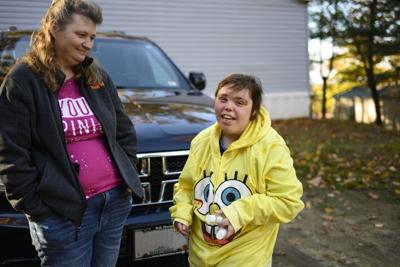GILFORD — For Lisa Verrill and her daughter Janessa, the first leg of a years-long quest ended Friday when the New Hampshire Superior Court ruled that young adults with developmental disabilities can now receive home and community services that have been denied because they are still in school.
“I’m happy about the law change,” said Lisa Verrill, a single mother of five children, three on the autism spectrum, including Janessa, who turns 21 in December and requires round-the-clock care. “I’ve been fighting for this since she was 16. This is going to make a lot of difference down the road for other people.”
Until now, young adults with disabilities who were in special education at high school fell into a gap, which required choosing between education services and the greater range of supports provided to disabled adults who are 21 and no longer in programs at school.
“We are pleased that the Court recognized the harm that this long-standing and unlawful practice was having on young adults with disabilities,” said Stephanie Patrick, executive director of Disability Rights Center – NH, which brought the lawsuit against the New Hampshire Department of Health and Human Services on behalf of the Verrill family of Gilford.
It’s a struggle that affects many families with children who have pervasive developmental disabilities, whose needs may increase with age – overwhelming the time and capabilities of parents who have intensively cared for them since they were born.
Janessa, who is non-verbal and struggles with emotional and behavior control, rarely sleeps for more than a couple of hours and requires constant supervision as well as help with toileting. Janessa is currently on a two-year wait list for residential placement. Verrill’s younger daughter, who turns 18 in January, will benefit from the law change, which extends all the services available to disabled adults to adult students with disabilities. Verrill’s 9-year-old son, whose behavior became increasingly aggressive and injurious to others, was recently placed in residential treatment.
Verrill says that up until now, children who are 18 to 21 have fallen into a gap, getting services that support their education in school, but not the range of services that can help them at work or at home.
According to a 2021 report by the University of New Hampshire’s Institute on Disability, one out of eight or 12.9 percent of New Hampshire’s 1.3 million residents have serious difficulity with vision, hearing, congnition or self-care that amount to a disability. That means almost 173,000 people statewide, including 16.3% of Belknap County’s population and 20.8 of Coos County.
Advocates for individuals with disabilities are optimistic about the court decision. “It’s going to have a broad impact,” said Todd Russell, litigation attorney for DRC-NH, the Concord-based non-profit that handled the case. “Having a child with a development disability, especially one whose disability makes them non-verbal, is very challenging for parents. A lot of parents don’t have the proper support structure to handle the challenges before them.”
“We are hopeful that eligible individuals will no longer have their status as students used against them when trying to access the critical services that they are legally entitled to,” said Patrick at DRC-NH.
Now, disabled individuals age 18 to 21 who are in special education programs in high schools will have access to career and employment training and support, as well as community-based residential living options and in-person assistance, including one-on-one help for the activities of daily living.
For Lisa Verrill, it’s been a long uphill fight, which she said is not over. Outside of school, the wait for services for profoundly disabled students is long. Parents are told there aren’t enough available staff at community agencies, including people who are trained to deal with behaviors that can quickly escalate and potentially injure others.
She said Janessa’s aide at Gilford High School has been a godsend, but administrators and others are much less sympathetic and seem quick to judge her for not being better able to control her children on the autism spectrum. Verrill said her greatest advocate remains her boss at Dunkin' Donuts, who accommodates Verrill’s shifting requirements to be home providing care and supervision, including on sick days, snow days or school vacations. Janessa’s needs have meant the family has not taken trips. Verrill said she cannot take the other children to after-school activities or pick them up after sports because Janessa’s emotions and behavior make leaving the home and waiting anywhere impossible.
“We’ve never been to Chuck-E-Cheese,” said Verrill. She added that other children have gone without her attention and interaction because of Janessa’s disability. A volunteer might be able to help the other children, she said. For the first time her 14-year-old twins and 17-year-old daughter are able to visit their older sister in Kentucky, who just had a baby. “We’re very restricted in what we can do,” she said.
Verrill is not sure how much the law change will be able to help Janessa, who will soon be out of programs at school.
“A lot of issues are social or behavioral, and not something the school could address through educational services,” said Russell. Until now, families could only get brief periods of respite through social service waiver programs, and no regular aides to help them at work or home. “Now they can get educational and developmental services” – not just one or the other, said Russell.
The web of benefits for people with disabilities is often complicated and sometimes overlaps. As a result of the court decision, disabled young adults who are still in school have better access to adaptive equipment and modifications at work, as well as communication technology that enables non-verbal individuals to communicate.
According to the New Hampshire Department of Health and Human Services, 7,557 individuals with developmental disabilities aged 3 and older were served by area agencies between July 2020 and June 2021. Approximately 90% were adults.


















(0) comments
Welcome to the discussion.
Log In
Keep it Clean. Please avoid obscene, vulgar, lewd, racist or sexually-oriented language.
PLEASE TURN OFF YOUR CAPS LOCK.
Don't Threaten. Threats of harming another person will not be tolerated.
Be Truthful. Don't knowingly lie about anyone or anything.
Be Nice. No racism, sexism or any sort of -ism that is degrading to another person.
Be Proactive. Use the 'Report' link on each comment to let us know of abusive posts.
Share with Us. We'd love to hear eyewitness accounts, the history behind an article.